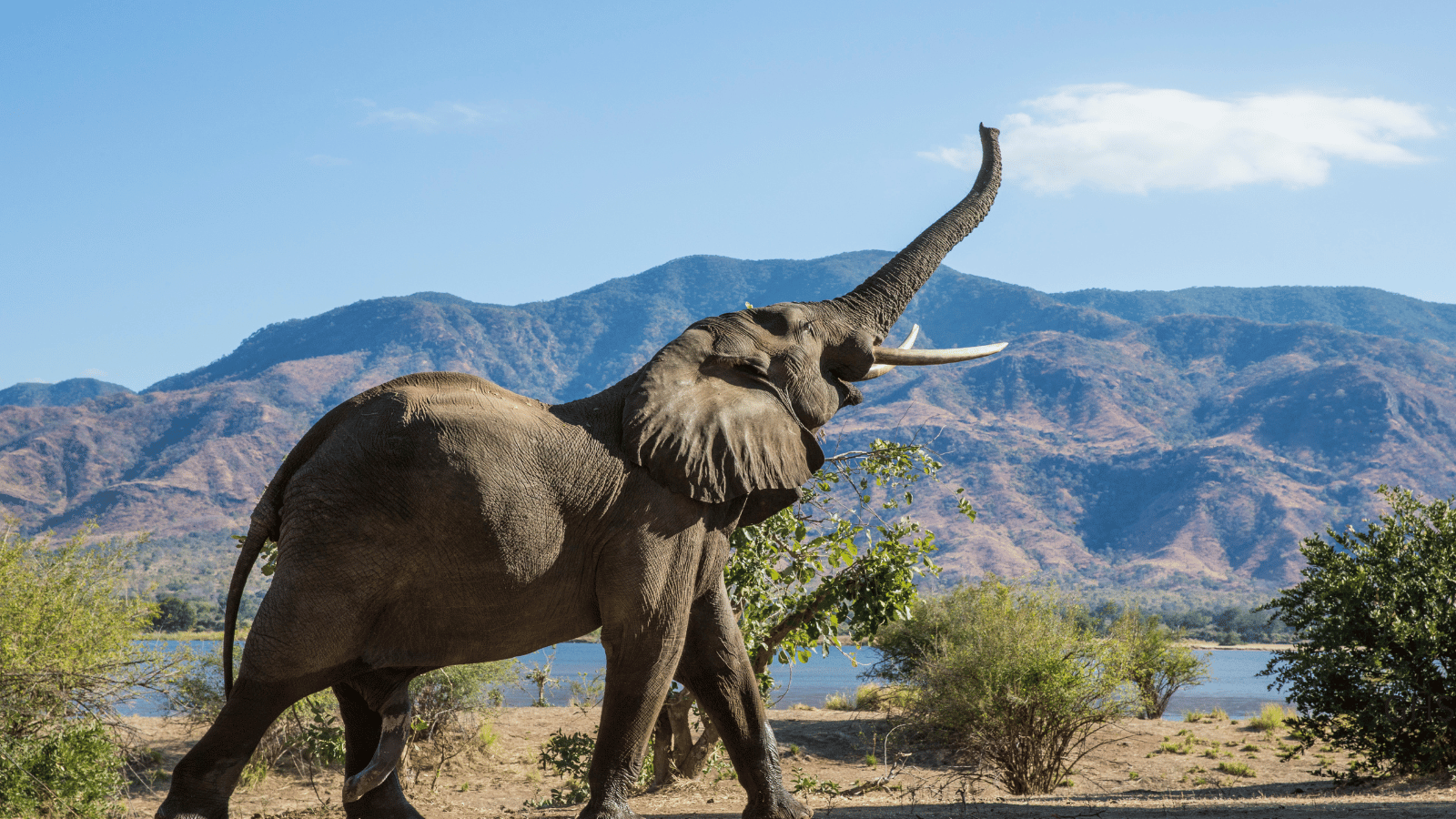Your Complete Guide to Pursuing the World’s Largest Land Mammal
Why Elephant Hunting Captures the Imagination of Texas Hunters
For many Texas sportsmen, elephant hunting represents the ultimate in dangerous game challenges. This isn’t your typical ranch whitetail stalk or hog eradication; this is Africa at its most raw and demanding. Elephants are iconic, powerful, and intelligent. They require respect, patience, and the highest level of hunting discipline.
For hunters from Texas, the allure lies in the sheer scale of the challenge. You’re not only tracking a massive animal weighing over 12,000 pounds, but you’re doing it in some of Africa’s most rugged and remote terrain. Every step in an elephant hunt demands skill, from reading tracks in dusty sand to making a precise shot on a moving target with skin over an inch thick.
[DYNAMIC-BLOGTABLEOFCONTENT]
The African Elephant: Power, Presence and Intelligence
Elephants are the largest living land mammals, and in the hunting world, they are as much about conservation and population management as they are about trophies.
Key traits Texas hunters should know:
- Exceptional Memory: Elephants can remember areas, hunters, and even previous encounters.
- Complex Social Structure: Most hunts target mature bulls, leaving breeding herds untouched.
- Incredible Senses: They detect scent, vibration, and sound from great distances.
- Physical Size: Bulls stand 10–13 feet tall at the shoulder and can carry tusks weighing over 100 pounds each.
Top African Countries for Elephant Hunts from Texas
Zimbabwe
- Peak Season: July – November.
- The Zambezi Valley and Hwange areas produce massive tuskers.
- Excellent PH networks and reliable trophy quality.
Namibia
- Peak Season: May – September.
- Well-managed hunting areas with strong conservation ethics.
- Known for desert-adapted elephants in the Kunene and Caprivi regions.
Botswana (selective quotas reinstated)
- Peak Season: April – September.
- Some of the heaviest ivory in Africa.
- Extremely limited tags, book years ahead.
Tanzania
- Peak Season: July – October.
- Remote concessions offer a true old-school safari experience.
Best Seasons for Texas Trophy Seekers
For Texas hunters booking African elephant hunts, cooler, dry months are optimal:
- May – September: Sparse vegetation makes tracking easier.
- Late Season (Oct – Nov): Water scarcity concentrates elephant herds.
Tracking Elephants: The Heart of the Hunt
Elephant hunting is about old-school tracking skills, something Texas hunters used to whitetail stands will find refreshingly different.
Step-by-step:
- Identify Fresh Sign: Large, circular tracks and fresh dung indicate proximity.
- Wind Direction: Always approach from downwind to avoid detection.
- Stalking: Cover miles on foot with a tracking team.
- Shot Opportunity: Close range — often under 50 yards.
- Shot Placement: Brain or heart/lung shots with heavy-caliber rifles.
Weapons & Caliber for Texas Elephant Hunters
This is true dangerous game hunting, requiring heavy calibers:
- Minimum: .375 H&H Magnum (legal minimum in most African countries).
- Preferred: .416 Rigby, .458 Lott, .470 Nitro Express.
- Ammo: Solid bullets for deep penetration through thick hide and bone.
Texas hunters should practice offhand and sticks shooting before departure. The shot window may be brief, and precision is vital.
Permits, CITES, and Legal Requirements
Elephant hunting is highly regulated:
- CITES Appendix II for most Southern African populations - trophy import permits required.
- U.S. Fish & Wildlife Approval - essential for bringing tusks into Texas.
- Outfitters handle local licenses, quotas, and export paperwork.
Book at least 12–18 months in advance to secure a slot.
Cost of Elephant Hunts for Texas Sportsmen
Expect $30,000–$70,000+ for a quality hunt, depending on:
- Country and concession.
- Size and weight of target ivory.
- Hunt duration (10–21 days).
- Inclusion of additional dangerous game species.
What’s usually included:
- PH services, trackers, skinners.
- Field preparation of trophies.
- All meals and accommodations in hunting camp.
- Transport within the concession.
Combination Hunts for the Ultimate African Adventure
Many Texas hunters combine elephant with:
- Cape buffalo for a true “heavy” dangerous game experience.
- Leopard to add a Big Five predator.
- Plains game to fill out the safari and diversify trophies.
Tips for Texas Trophy Seekers
- Physical Prep: Expect to walk 5–10 miles daily in challenging terrain.
- Mental Discipline: Elephant hunts can mean days without a clear opportunity.
- Trust the PH: They’ll judge tusk size and advise on legality.
- Gear Up Right: Durable boots, moisture-wicking clothing, and a quality rifle sling.
- Book Early: Limited quotas mean the best concessions go fast.
Travel Routes for Texas Hunters
- Dallas/Fort Worth (DFW): Qatar Airways, Emirates, or Delta via Europe to Johannesburg/Windhoek.
- Houston (IAH): KLM, Emirates, or Qatar with firearm-friendly policies.
- Austin/San Antonio: Connect through DFW or IAH.
Arrive 2–3 days early to check rifles and acclimate.
Why Game Hunting Safaris is the Texas Hunter’s Choice
At Game Hunting Safaris, we:
- Match Texas hunters with proven elephant outfitters.
- Handle CITES and import/export permits.
- Provide transparent, no-surprise pricing.
- Arrange professional trophy shipping to Texas.
Start Your African Elephant Hunting Journey
Elephant hunting is not just another trip, it’s a legacy experience. For Texas hunters ready to take on the challenge of Africa’s largest game, planning begins now.
Game Hunting Safaris
5900 Balcones Drive, STE 100, Austin, TX 78731
Email: info@gamehuntingsafaris.com
USA Contact (WhatsApp): +1 470 309 6306
Contact Us | View Google Business Profile
Frequently Asked Questions
1. Is elephant hunting legal for Texas hunters?
Yes, in countries with approved quotas and proper CITES permits.
2. Can I import ivory to Texas?
Yes, with U.S. Fish & Wildlife Service approval and compliance with CITES rules.
3. What’s the average shot distance?
Often under 50 yards for accuracy and penetration.
4. How long should I plan for?
10–21 days depending on the country and concession size.
5. Which country offers the best first-time experience?
Namibia and Zimbabwe are top choices for accessibility and trophy quality.
